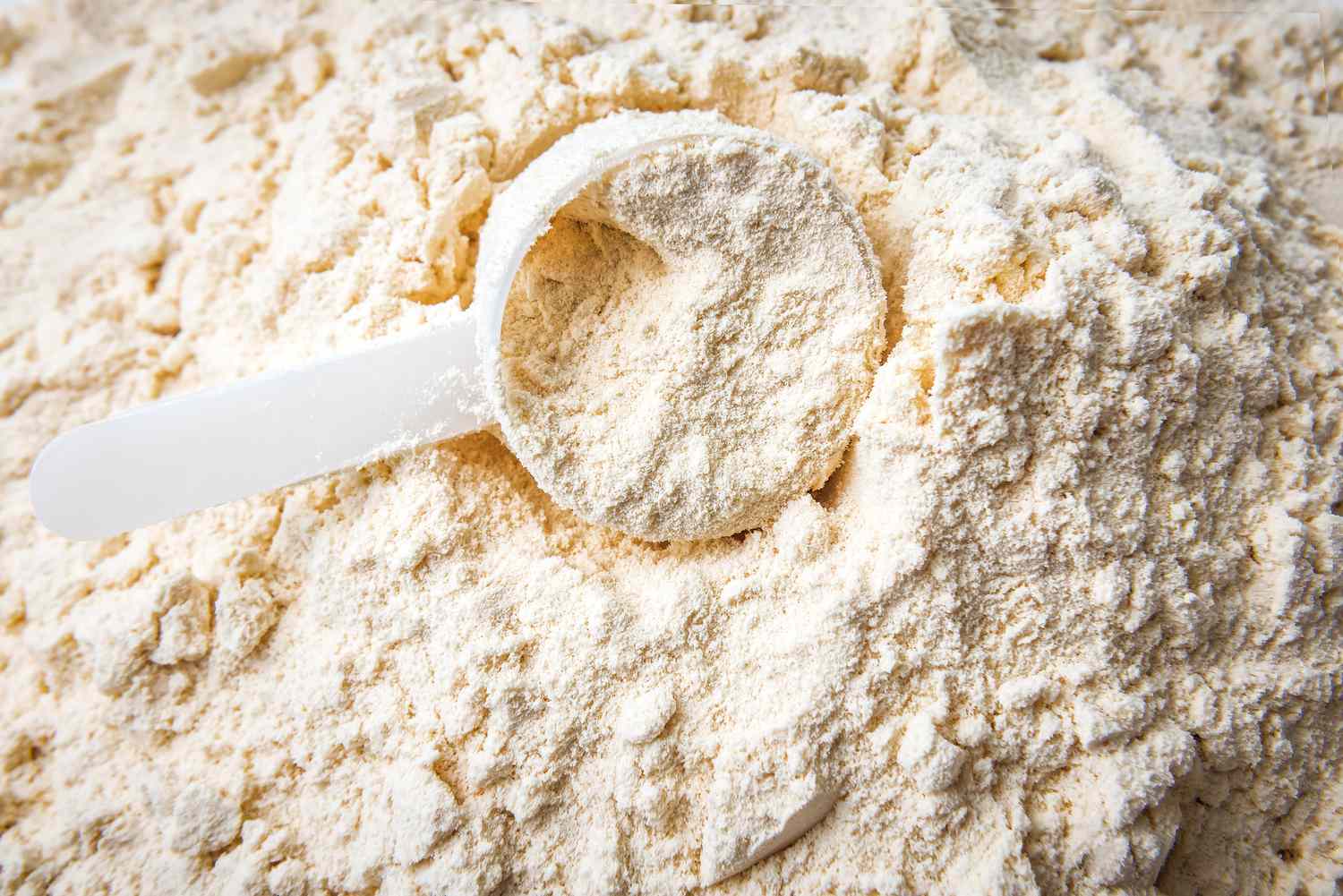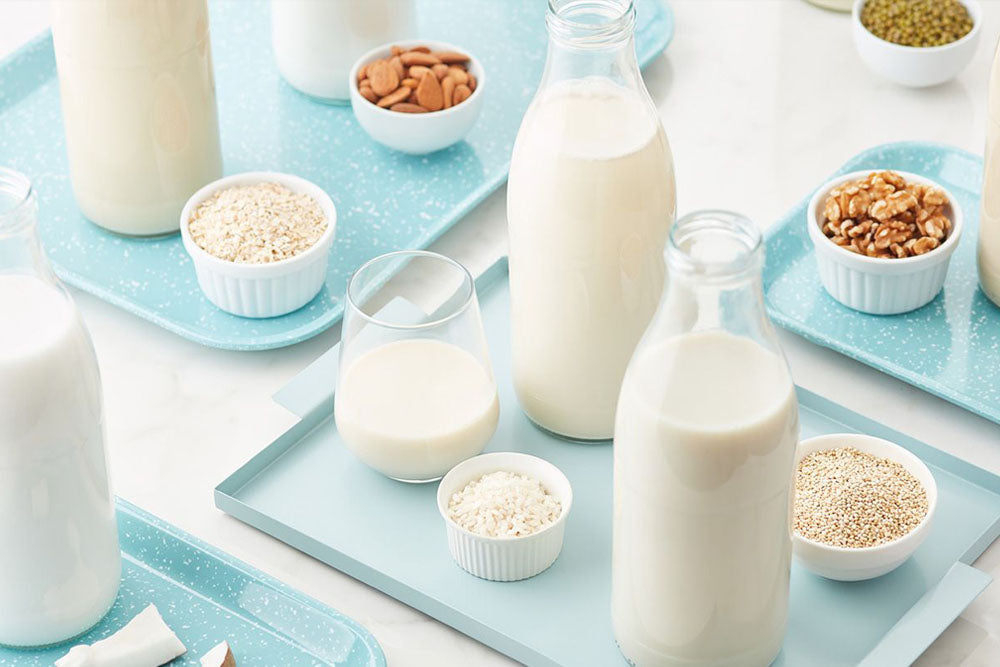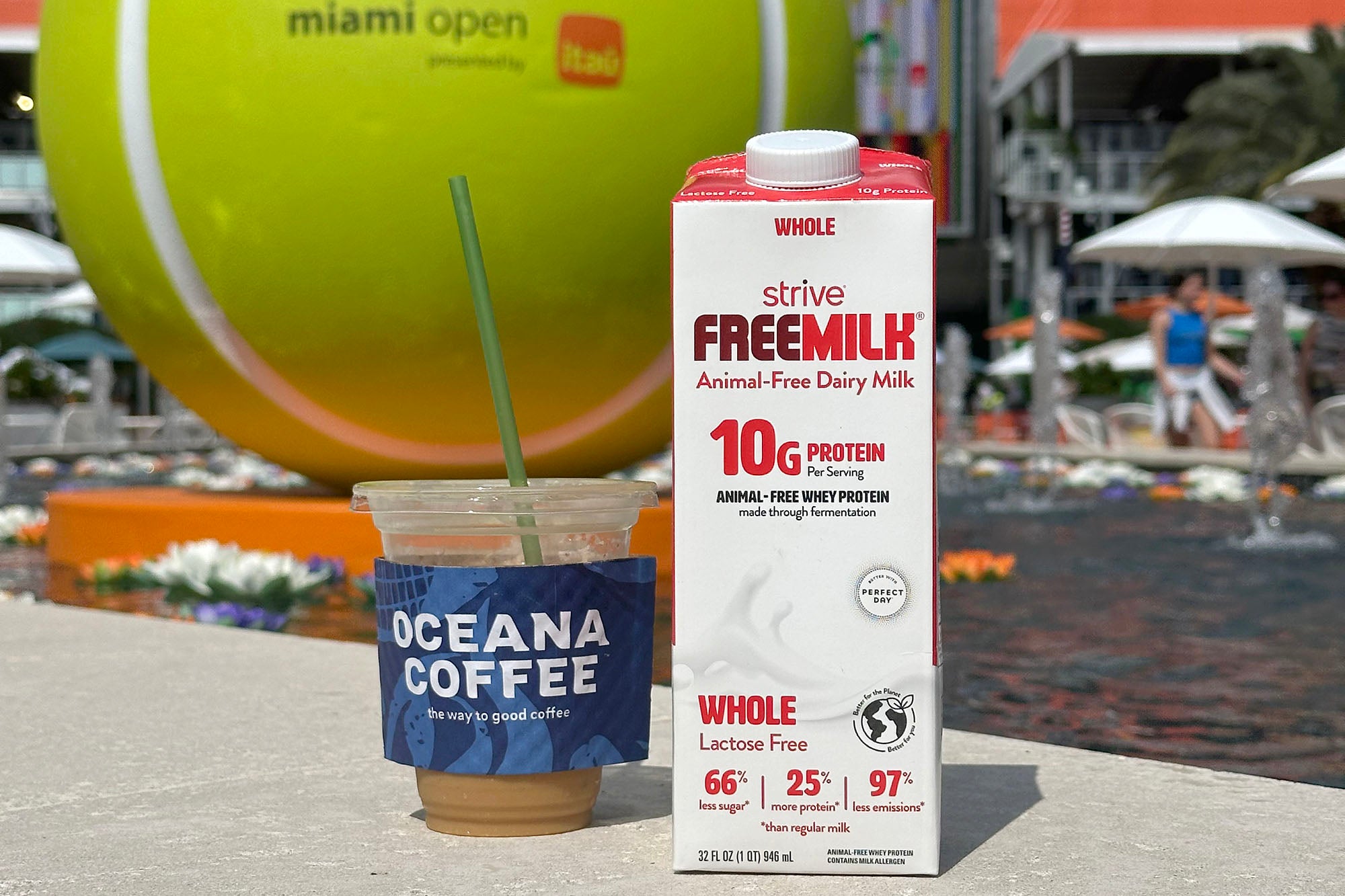The Benefits of Animal-Free Whey Protein

Whey protein is a dairy product obtained from cow’s milk. It’s found in the watery portion of milk that separates from the curds during the cheese-making process. The whey is collected and pasteurized, and then the protein is concentrated and isolated. Whey protein isolate provides a substantial amount of essential amino acids needed for muscle building, creating new immune cells, and other functions that proteins perform in the body. Typically in the form of a powder, whey protein isolate can be added to liquids or soft foods and blended in smoothies to act as a supplement. People commonly use whey protein powder to improve athletic performance and address nutritional deficiencies or problems.
Whey protein is an ingredient in many products, as the benefits are thought to be far-reaching. Whey protein can be used in everything from high-protein cookies and sports drinks to jugs of protein powder for bodybuilders, and the market has surged in recent years. However, dairy is one of the most common food allergens, and whey is a milk protein. Milk is made up of casein and whey proteins. Conventional whey protein is a dairy protein and contains lactose. As a result, whey protein can have numerous side effects for those with lactose intolerance or aversions to animal products.
This has led to increasing demand for animal-free whey protein, which is high in essential amino acids and easily absorbed by your body while mitigating the possible side effects for those with lactose intolerance. It also addresses the concerns of vegans who are against any kind of animal-based product, as well as people wanting to integrate more sustainably produced foods into their diets. California-based food tech company Perfect Day Foods, Inc., has developed new technologies for producing sustainable non-animal-based whey protein.
Perfect Day’s animal-free proteins are produced through a very precise fermentation process that relies on tiny organisms called microflora to make proteins that are identical to conventional whey protein found in cow’s milk. Their facilities look much like a brewery, as the protein is made in large fermentation tanks, much like how beer and wine are produced.
Flora is an all-encompassing term that refers to a microorganism like bacteria, yeast, or fungi. Microflora is used to make proteins because they have a proven ability to make ingredients in many foods you eat today. Additionally, microflora is good at producing animal proteins. The microflora is fed the genetic blueprint corresponding to milk protein. Then they are fed plant-based sugars that trigger a fermentation process, which results in pure whey protein that is identical to the proteins found in regular cow’s milk. The resulting product is an animal-free whey protein that delivers the same creamy, melty, silky texture and taste as regular dairy.
Non-animal whey protein is now used in various products to provide vegan-based dairy foods and milk products. Incorporated into Strive FREEMILK, for example, it’s just as creamy and nutritious as the real thing but better for those looking to reduce milk consumption for health reasons or environmental concerns. Strive FREEMILK whips, foams, blends, cooks, and tastes like traditional milk, but it’s free of lactose, cholesterol, hormones, antibiotics, and the harmful effects of factory dairy farms. Strive FREEMILK incorporates whey protein alternatives for 66 percent less sugar than traditional whole dairy milk and less saturated fat.
Animal-free whey protein has the same nutritional profile and functionality as whey protein from milk. However, unlike cow’s milk, it is free from many of the drawbacks of regular dairy and has a much smaller environmental footprint. These alternatives to whey protein are ideal for providing a rich, creamy, smooth, and indulgent eating experience. They excel in product applications that require solubility, gelation, water-binding, foaming, heat, stability, and emulsification. Let’s take a closer look at the benefits of animal-free dairy.
Delicious and Useful Products
With the prevalence of dairy allergens, lactose intolerance, and the rise of plant-based and vegan-based lifestyles, there has been a push to create dairy products using plant sources. Unfortunately, the dairy experience can’t be easily replicated. Things like ice cream, milk, cheese, yogurt, and butter are some of the most popular dairy products that people don’t want to live without. And dairy serves as an essential ingredient in many dishes and baked goods. Dairy provides body, flavor, and richness to creamy sauces, delicious baked goods, and beverages.
When used in dough, milk adds strength and moisture and produces a pleasing golden crust. Milk can also create frothy goodness in your latte, cappuccino, and whipped desserts. Premium cheeses also make grilled sandwiches gooey and melty. These are just a few examples of what dairy products do for your food.
The resulting goodness that comes from using dairy results from the specific proteins that are unique to cow’s milk. These proteins coat fat droplets, stabilize air bubbles, and lock in moisture. The molecular functions of milk proteins provide the flavors and textures we desire. However, plant-based proteins don’t function the same way and aren’t capable of providing the same qualities as dairy. As a result, many people often notice a considerable difference in plant-based cheeses and butter. Many plant-based products don’t have the same taste, texture, or characteristics as items that incorporate dairy protein.
Animal-free whey mimics traditional dairy products and contains proteins that are identical to those found in cow’s milk. As a result, products like Strive FREEMILK with non-animal whey protein can be whipped, blended, and cooked just like regular milk. With non-animal whey protein, you can use products the same way as regular dairy items and create foods that taste and feel the same.
High-Quality Animal-Free Proteins
Protein is a critical aspect of a healthy diet. It is essential for muscle, bone, and tissue health. Protein also helps to satisfy your appetite and allows you to go for several hours without feeling hungry. This is why many people supplement some meals with a protein shake. While you can get protein from various sources, not all of them are created equal. Milk protein is considered one of the highest-quality proteins, as it contains all nine essential amino acids and is more easily absorbed by the body than plant proteins. Because the human body doesn’t produce these amino acids, they must be provided through a balanced diet.
While plants can be a good source of protein, most plant proteins are considered incomplete sources of essential amino acids by experts. Since most plants are limited in essential amino acids, you have to eat a greater variety of plants in greater volume to ensure an adequate supply of the amino acids you need. Additionally, plant proteins have a lower bioavailability than dairy proteins, meaning they aren’t absorbed into the digestive system as easily.
All proteins are rated on a protein digestibility corrected amino acid score (PDCAAS). This score assesses the concentration of amino acids and their bioavailability. A higher score indicates a better protein. The highest possible score is 1.00. Conventional dairy has a score of 1.00, while plant-based proteins generally score much lower, with the exception of soy protein. Given that animal-free whey protein is identical to traditional whey, it contains the same nutritional benefits and all of the essential amino acids required for a healthy diet.
Animal-free dairy whey protein is a real bio-identical dairy protein but doesn’t contain things like lactose, cholesterol, hormones, or antibiotics. With alternative whey, you can get all of the benefits and powerful amino acids without the drawbacks of animal inputs. Additionally, because of the precision fermentation process required for creating alternative whey, there is no risk of contamination from pathogens that might be associated with cows and milk. Animal-free-whey provides high-value protein without any of the associated issues of conventional dairy.
Animal-Friendly Product
While many people adopt a vegetarian or vegan diet for health reasons, many others do so because of objections over the inhumane treatment of animals on large industrial farms. From meatless meals to animal-free products, there are many ways that people express their beliefs in an animal-free lifestyle. As a result, many industries, food producers, and food tech companies are making great strides to incorporate animal-free products. Since animal-free whey is not derived from dairy milk, it is a completely animal-friendly product.
To harvest traditional dairy protein, it must be separated from cow’s milk. In order for a cow to produce milk, however, it must have given birth to an offspring. To ensure the continued production of milk, dairy cows must be kept in a constant cycle of pregnancy and lactation. This can be hard on the cow’s body and is seen as a cruel practice by many. This is one of the common objections that many people have to using and consuming dairy products.
Animal-free whey doesn’t rely on animals or their bodies to provide a quality product packed with essential proteins. Animal-free dairy bypasses the need for cattle milk by relying on a unique fermentation process to replicate dairy protein. Microbes are engineered to produce proteins in tanks that mimic the biological process cows use to make milk. By using microflora that is similar to yeast, the process is able to turn plant sugars into protein. The result is a product that is identical to dairy protein but free from any animal inputs.
Vegan and Vegetarian
There are many reasons for following a vegan diet and many definitions of this lifestyle. For some, veganism is driven principally by concerns for animal welfare. For others, it’s about choosing a healthier, more planet-friendly lifestyle. Still, others cite religious or spiritual considerations. And for some, it’s a blend of some or all of these factors. Many people consider products that contain animal-free whey protein to be vegan and vegetarian friendly because no animal inputs are used, either directly in the product itself or in the production of the product. Since the process of creating animal-free whey protein is derived from a plant-based input, it falls within the definition of a completely animal-free product. As a result, products such as Strive FREEMILK can fit into any plant-based diet since the whey protein in Strive FREEMILK is molecularly identical to the whey protein found in cow’s milk but made without any animal inputs.
If you define veganism as eliminating the consumption of animal products made with animal-free whey protein from Perfect Day may fit the bill. But, your personal definition of veganism will determine if this product is suitable for you.
However, it’s important to note that Perfect Day’s animal-free protein does contain milk allergens. So, if you are allergic to cow’s milk, Strive FREEMILK may not be for you.
Versatile
While the most recognized use of whey protein is in whey protein powder, there are many uses for non-animal whey protein. This type of alternative protein is changing the way food and other consumable products are made. It can be blended into products ranging from alternative milk and ice cream to cheese and cake mixes. The result is next-generation lactose-free products that are creamy, satisfying, nutritious, and planet-friendly. Just like other whey protein powder, it can also be flavored and included in smoothies and shakes for delicious drinks. Animal-free whey protein is gluten-free and does not contain wheat, rye, or barley. Perfect Day’s animal-free whey protein is also Kosher certified.
Companies like Strive Nutrition are partnering with Perfect Day to include animal-free whey protein in plant-based milks as well. Products like oat milk and almond milk have become popular, however, they lack both the quantity and quality of the beneficial protein found in traditional milk. By including the animal-free whey protein in plant-based milk products, companies like Strive can elevate both the nutritional value as well as the taste and texture of these alternative plant-based options.
Safe Alternative
When Perfect Day animal-free whey protein is produced, regulatory and safety standards are carefully followed. Perfect Day’s protein has been recognized as GRAS (Generally Recognized as Safe) and has received a letter of “no objections” from the United States Food and Drug Administration.
In addition to being safe, animal-free whey does not contain GMOs. While genetic engineering is part of the process of “programming” the microflora to produce whey protein, genetically modified organisms and detectable genetic material are not present in the final protein. After the microflora is used during the production process to create various kinds of protein naturally, the flora is then filtered out, leaving only the pure protein.
Environmentally Friendly
One of the problems associated with modern farming techniques is the emission of greenhouse gases which have been found to be a major contributor to climate change. A recent study found that meat, aquaculture, eggs, and dairy products account for around 57 percent of the global food system’s total greenhouse gas emissions. Significant harmful gasses are being produced even though these sources only account for about 37 percent of the protein for the global population. Harmful greenhouse gasses lead to climate changes by trapping heat and warming the planet. Animal-free whey production is helping to create high-quality proteins while reducing greenhouse gasses produced from dairy farming.
Aside from greenhouse gas emissions, animal agriculture has also led to biodiversity loss and deforestation. The need for more feed crops has led to the clearing of vast natural habitat areas and carbon stores to make way for farmland. The environmental impacts are significant when considering the greenhouse emissions produced from farming methods and the loss of natural carbon removers with cleared land. By reducing the need for dairy cows and the farming methods required to raise dairy cows, alternative whey production can prove to be very environmentally friendly.
Alternative whey production emits significantly less greenhouse gas and uses a fraction of the land, energy, and water required for standard dairy farming practices. Perfect Day Food’s animal-free whey protein production process not only uses no animals, but it also reduces water use by up to 99%, emits up to 97% less greenhouse gas emissions, and uses up to 60% less non-renewable energy compared to conventional production methods.
Food production practices are critical for the global population, however, climate change and biodiversity are threatening the planet. It is essential that the food industry explore possible solutions to mitigate environmental impacts. Alternative whey production uses precision fermentation to offer a new way of producing dairy items. This new process doesn’t rely on animals or the farm practices involved in raising animals. Non-animal whey protein provides nutrients and food without damaging the planet. This is a convenient protein option for consumers looking to add protein to their daily diet while making greener choices.
Food Supply Chain Promotion
Many regions of the world without available land or resources needed to sustain dairy production rely on imports from other countries. By investing in animal-free processes such as precision fermentation, regional food security can be bolstered, nutrition equity promoted, and economies strengthened by producing dairy locally. Animal-free dairy provides solutions to promote the global food supply chain that fit seamlessly into manufacturing processes. By working with food companies worldwide, animal-free dairy products can help bolster supply chains with nutritious options and scalable solutions.
Non-animal whey protein is bioidentical to the traditional whey protein found in cow’s milk. It is a healthy, safe, and great-tasting alternative to regular milk that is suitable for a vegan diet or for someone who seeks to cut back on cholesterol and fat. Compared to regular protein from cow’s milk, animal-free protein production produces fewer greenhouse emissions, uses less water, less energy, and fewer resources for an eco-friendly product. From the health benefits and versatility to the reduced environmental impacts, non-animal protein is a great non-dairy alternative.
Strive Nutrition Corp. is a sustainable nutritional beverage company on a mission to make things simpler, healthier, and better for the planet. As a result, Strive FREEMILK, Oat Milk, and Almond Milk incorporate non-animal protein from Perfect Day to create products that are both sustainable and delicious. Milk alternatives enriched with Perfect Day’s protein deliver the taste and nutrition of regular cow’s milk but without the downsides like lactose, hormones, cholesterol, antibiotics, or factory farms that are harmful to animals and the planet. Any of our products are a great option for milk alternatives to include in your diet and favorite recipes.



